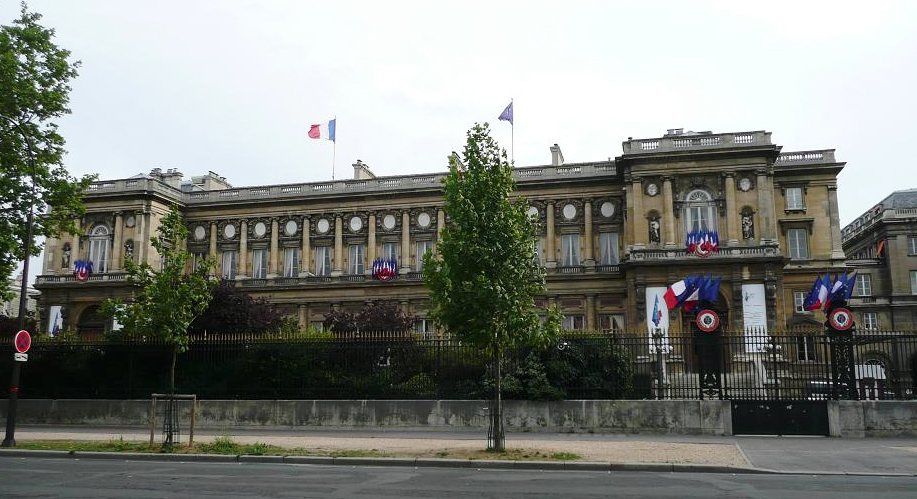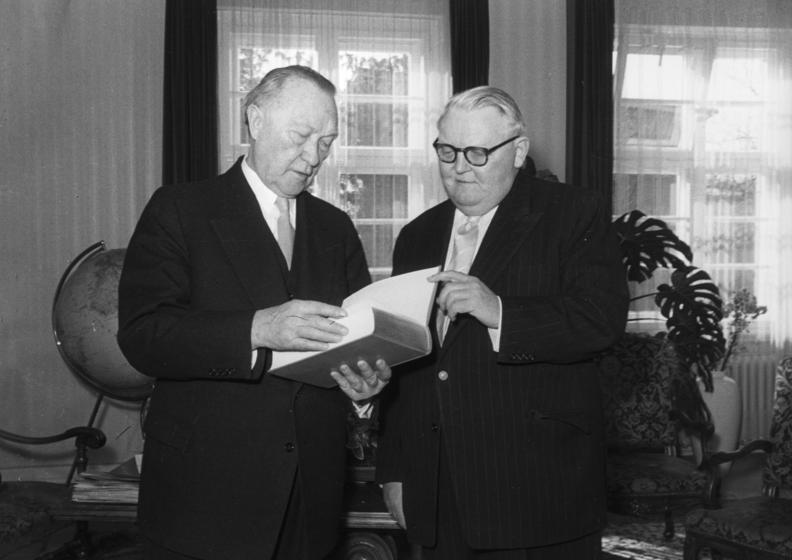|
Hans Von Der Groeben
Hans von der Groeben (14 May 1907 – 6 March 2005) was a German diplomat, lawyer and journalist and member of the European Commission. Von der Groeben was born in Langheim (today Łankiejmy, Poland) near Rastenburg, East Prussia. A son of landowner Georg von der Groeben and Eva von Mirbach, he studied jurisprudence and political economics at the Universities of Berlin, Bonn and Göttingen. After the state exams he became a government advisor in 1933 at the Ministry of Nutrition (Reichsernährungsministerium) and in 1937 transferred to his final advisory position for credit and cooperatives (Referats für das Kredit- und Genossenschaftswesen). For periods during the Second World War he served as a reserve in the armed forces, ending up as a first lieutenant. After the war he became a director of government in the Treasury of Lower Saxony. Federal Minister for Economic Affairs Ludwig Erhard recruited him from there to work on Germany's response to the Schuman Declaration f ... [...More Info...] [...Related Items...] OR: [Wikipedia] [Google] [Baidu] |
European Commissioner For Internal Market And Services
The Commissioner for Internal Market is a member of the European Commission. The post is currently held by Commissioner Thierry Breton. Responsibilities The portfolio concerns the development of the 480-million-strong European single market, promoting free movement of people, goods, services and capital. Thus it is clearly a leading role but has become more complex as the single market for services has developed. A large area of work is now financial services, a politically sensitive topic for some member states (notably, the UK). The Commissioner controls the Directorate-General for Internal Market and Services, Directorate-General for Communications Networks, Content and Technology and the Office for Harmonization in the Internal Market.Who’s who in the new Commission ''Financial Times'', ... [...More Info...] [...Related Items...] OR: [Wikipedia] [Google] [Baidu] |
University Of Göttingen
The University of Göttingen, officially the Georg August University of Göttingen, (german: Georg-August-Universität Göttingen, known informally as Georgia Augusta) is a public research university in the city of Göttingen, Germany. Founded in 1734 by George II, King of Great Britain and Elector of Hanover, and starting classes in 1737, the Georgia Augusta was conceived to promote the ideals of the Enlightenment. It is the oldest university in the state of Lower Saxony and the largest in student enrollment, which stands at around 31,600. Home to many noted figures, it represents one of Germany's historic and traditional institutions. According to an official exhibition held by the University of Göttingen in 2002, 44 Nobel Prize winners had been affiliated with the University of Göttingen as alumni, faculty members or researchers by that year alone. The University of Göttingen was previously supported by the German Universities Excellence Initiative, holds membership ... [...More Info...] [...Related Items...] OR: [Wikipedia] [Google] [Baidu] |
European Economic Community
The European Economic Community (EEC) was a regional organization created by the Treaty of Rome of 1957,Today the largely rewritten treaty continues in force as the ''Treaty on the functioning of the European Union'', as renamed by the Lisbon Treaty. aiming to foster economic integration among its member states. It was subsequently renamed the European Community (EC) upon becoming integrated into the first pillar of the newly formed European Union in 1993. In the popular language, however, the singular ''European Community'' was sometimes inaccuratelly used in the wider sense of the plural ''European Communities'', in spite of the latter designation covering all the three constituent entities of the first pillar. In 2009, the EC formally ceased to exist and its institutions were directly absorbed by the EU. This made the Union the formal successor institution of the Community. The Community's initial aim was to bring about economic integration, including a common market a ... [...More Info...] [...Related Items...] OR: [Wikipedia] [Google] [Baidu] |
Spaak Report
The Spaak Report or ''Brussels Report on the General Common Market'' is the report drafted by the Spaak Committee in 1956. The Intergovernmental Committee, headed by Paul-Henri Spaak, presented its definitive report on 21 April 1956 to the six governments of the member states of the European Coal and Steel Community. The report formed the cornerstone of the Intergovernmental Conference on the Common Market and Euratom at Val Duchesse in 1956 and led to the signing, on 25 March 1957, of the Treaties of Rome establishing a European Economic Community and the European Atomic Energy Community. Summary The Spaak Report concluded that a sector-by-sector integration of the European economies would be difficult. Instead, a horizontal integration of the economy, by the gradual elimination of trade barriers, seemed to be the way to continue. The goal was to be achieved by creating a customs union. On the integration of the energy sectors, there was a different stance for nuclear energy and ... [...More Info...] [...Related Items...] OR: [Wikipedia] [Google] [Baidu] |
European Coal And Steel Community
The European Coal and Steel Community (ECSC) was a European organization created after World War II to regulate the coal and steel industries. It was formally established in 1951 by the Treaty of Paris, signed by Belgium, France, Italy, Luxembourg, the Netherlands, and West Germany. The ECSC was an international organization based on the principle of supranationalism, and started a process of integration which ultimately led to the creation of the European Union. The ECSC was first proposed as the Schuman Declaration by French foreign minister Robert Schuman on the 9th of May 1950 (today's Europe Day of the EU), the day after the fifth anniversary of the end of World War II, as a way to prevent further war between France and Germany. He declared he aimed to "make war not only unthinkable but materially impossible" which was to be achieved by regional integration, of which the ECSC was the first step. The Treaty would create a common market for coal and steel among its me ... [...More Info...] [...Related Items...] OR: [Wikipedia] [Google] [Baidu] |
Schuman Declaration
The Schuman Declaration, or Schuman Plan, was a proposal to place French and West German production of coal and steel under a single authority that later became the European Coal and Steel Community, made by the French foreign minister, Robert Schuman, on the 9th of May 1950 (now celebrated in the EU as Europe Day), the day after the fifth anniversary of the end of World War II. The alliance would later be opened to other European countries. The ultimate goal was to pacify relations, especially between France and West Germany, through gradual political integration to be achieved by creating common interests. Schuman said that " e coming together of the countries of Europe requires the elimination of the age-old opposition of France and Germany ... the solidarity in production thus established will make it plain that any war between France and Germany becomes not merely unthinkable, but materially impossible." Konrad Adenauer, the first Chancellor of the Federal Republic o ... [...More Info...] [...Related Items...] OR: [Wikipedia] [Google] [Baidu] |
Ludwig Erhard
Ludwig Wilhelm Erhard (; 4 February 1897 – 5 May 1977) was a German politician affiliated with the Christian Democratic Union (CDU), and chancellor of West Germany from 1963 until 1966. He is known for leading the West German postwar economic reforms and economic recovery ('' Wirtschaftswunder'', German for "economic miracle") in his role as Minister of Economic Affairs under Chancellor Konrad Adenauer from 1949 to 1963. During that period he promoted the concept of the social market economy (''soziale Marktwirtschaft''), on which Germany's economic policy in the 21st century continues to be based. In his tenure as Chancellor, however, Erhard lacked support from Adenauer, who remained chairman of the party until 1966, and failed to win the public's confidence in his handling of a budget deficit and his direction of foreign policy. His popularity waned, and he resigned his chancellorship on 30 November 1966. Early life Ludwig Erhard was born in Fürth, Kingdom of Bavaria on ... [...More Info...] [...Related Items...] OR: [Wikipedia] [Google] [Baidu] |
Lower Saxony
Lower Saxony (german: Niedersachsen ; nds, Neddersassen; stq, Läichsaksen) is a German state (') in northwestern Germany. It is the second-largest state by land area, with , and fourth-largest in population (8 million in 2021) among the 16 ' federated as the Federal Republic of Germany. In rural areas, Northern Low Saxon and Saterland Frisian are still spoken, albeit in declining numbers. Lower Saxony borders on (from north and clockwise) the North Sea, the states of Schleswig-Holstein, Hamburg, , Brandenburg, Saxony-Anhalt, Thuringia, Hesse and North Rhine-Westphalia, and the Netherlands. Furthermore, the state of Bremen forms two enclaves within Lower Saxony, one being the city of Bremen, the other its seaport, Bremerhaven (which is a semi-enclave, as it has a coastline). Lower Saxony thus borders more neighbours than any other single '. The state's largest cities are state capital Hanover, Braunschweig (Brunswick), Lüneburg, Osnabrück, Oldenburg, Hildesheim, ... [...More Info...] [...Related Items...] OR: [Wikipedia] [Google] [Baidu] |
Göttingen
Göttingen (, , ; nds, Chöttingen) is a university city in Lower Saxony, central Germany, the capital of the eponymous district. The River Leine runs through it. At the end of 2019, the population was 118,911. General information The origins of Göttingen lay in a village called ''Gutingi, ''first mentioned in a document in 953 AD. The city was founded northwest of this village, between 1150 and 1200 AD, and adopted its name. In medieval times the city was a member of the Hanseatic League and hence a wealthy town. Today, Göttingen is famous for its old university (''Georgia Augusta'', or "Georg-August-Universität"), which was founded in 1734 (first classes in 1737) and became the most visited university of Europe. In 1837, seven professors protested against the absolute sovereignty of the kings of Hanover; they lost their positions, but became known as the " Göttingen Seven". Its alumni include some well-known historical figures: the Brothers Grimm, Heinrich Ewal ... [...More Info...] [...Related Items...] OR: [Wikipedia] [Google] [Baidu] |
Jurisprudence
Jurisprudence, or legal theory, is the theoretical study of the propriety of law. Scholars of jurisprudence seek to explain the nature of law in its most general form and they also seek to achieve a deeper understanding of legal reasoning and analogy, legal systems, legal institutions, and the proper application of law, the economic analysis of law and the role of law in society. Modern jurisprudence began in the 18th century and it was based on the first principles of natural law, civil law, and the law of nations. General jurisprudence can be divided into categories both by the type of question scholars seek to answer and by the theories of jurisprudence, or schools of thought, regarding how those questions are best answered. Contemporary philosophy of law, which deals with general jurisprudence, addresses problems internal to law and legal systems and problems of law as a social institution that relates to the larger political and social context in which it exists.Sh ... [...More Info...] [...Related Items...] OR: [Wikipedia] [Google] [Baidu] |
East Prussia
East Prussia ; german: Ostpreißen, label= Low Prussian; pl, Prusy Wschodnie; lt, Rytų Prūsija was a province of the Kingdom of Prussia from 1773 to 1829 and again from 1878 (with the Kingdom itself being part of the German Empire from 1871); following World War I it formed part of the Weimar Republic's Free State of Prussia, until 1945. Its capital city was Königsberg (present-day Kaliningrad). East Prussia was the main part of the region of Prussia along the southeastern Baltic Coast. The bulk of the ancestral lands of the Baltic Old Prussians were enclosed within East Prussia. During the 13th century, the native Prussians were conquered by the crusading Teutonic Knights. After the conquest the indigenous Balts were gradually converted to Christianity. Because of Germanization and colonisation over the following centuries, Germans became the dominant ethnic group, while Masurians and Lithuanians formed minorities. From the 13th century, East Prussia was part of th ... [...More Info...] [...Related Items...] OR: [Wikipedia] [Google] [Baidu] |








